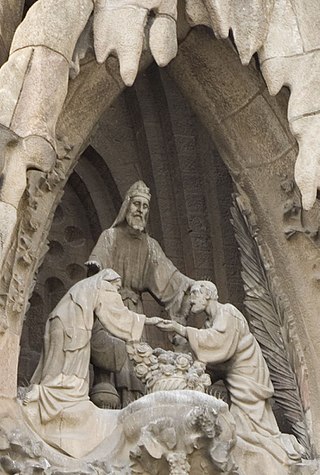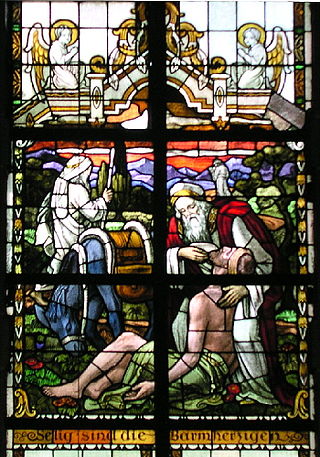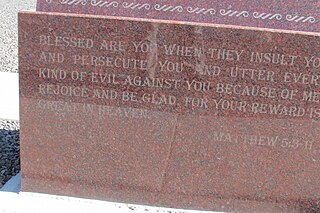
The Beatitudes are sayings of Jesus, and in particular eight or nine blessings recounted by Jesus in the Sermon on the Mount in the Gospel of Matthew, and four in the Sermon on the Plain in the Gospel of Luke, followed by four woes which mirror the blessings. Each is a proverb-like proclamation, without narrative.

Matthew 1:19 is the nineteenth verse of the first chapter in the Gospel of Matthew in the New Testament. It is part of the description of the events surrounding the birth of Jesus. In the previous verse, Joseph has found Mary to be pregnant, and in this verse he considers leaving her.

Matthew 3:16 is the sixteenth verse of the third chapter of the Gospel of Matthew in the New Testament. Jesus has just been baptized by John the Baptist and the Holy Spirit comes to him like a dove.

Matthew 4:1 is the first verse of the fourth chapter of the Gospel of Matthew in the New Testament. This verse opens the section in Matthew dealing with the temptation of Christ by Satan. Jesus has just been baptized by John the Baptist; in this verse he is led out into the wilderness.

Matthew 4:3 is the third verse of the fourth chapter of the Gospel of Matthew in the New Testament. This verse opens the section in Matthew dealing with the temptation of Christ by Satan. Jesus has been fasting for forty days and forty nights, and in this verse the devil gives Christ his first temptation by encouraging him to use his powers to get food.

Matthew 4:5 is the fifth verse of the fourth chapter of the Gospel of Matthew in the New Testament. Jesus has just rebuffed Satan's first temptation, and in this verse the devil transports him to the site of the second temptation.

Matthew 4:17 is the seventeenth verse of the fourth chapter of the Gospel of Matthew in the New Testament of the Christian Bible. In the previous verses Jesus returned to Galilee after hearing of the arrest of John the Baptist and then left Nazareth for Capernaum. This verse reports that once in Capernaum, Jesus began to preach.

Matthew 5:1 and Matthew 5:2 are the first two verses of the fifth chapter of the Gospel of Matthew in the New Testament. The verses introduce the Sermon on the Mount that will be recited in the next several chapters. The previous chapter concluded with large crowds "from Galilee, and from the Decapolis, Jerusalem, Judea, and beyond the Jordan" who followed Jesus to witness him healing: these verses present Jesus as seeing the crowds and going up onto a mountain to begin teaching.

Matthew 5:4 is the fourth verse of the fifth chapter of the Gospel of Matthew in the New Testament. It is the second verse of the Sermon on the Mount, and the second of what are known as the Beatitudes.

Matthew 5:5 is the fifth verse of the fifth chapter of the Gospel of Matthew in the New Testament. It is the third verse of the Sermon on the Mount, and also the third of what are known as the Beatitudes.

Matthew 5 is the fifth chapter of the Gospel of Matthew in the New Testament. It contains the first portion of the Sermon on the Mount, the other portions of which are contained in chapters 6 and 7. Portions are similar to the Sermon on the Plain in Luke 6, but much of the material is found only in Matthew. It is one of the most discussed and analyzed chapters of the New Testament. Warren Kissinger reports that among early Christians, no chapter was more often cited by early scholars. The same is true in modern scholarship.

Matthew 5:7 is the seventh verse of the fifth chapter of the Gospel of Matthew in the New Testament. It is the fifth verse of the Sermon on the Mount, and also the fifth of what are known as the Beatitudes.

Matthew 5:8 is the eighth verse of the fifth chapter of the Gospel of Matthew in the New Testament. It is the sixth verse of the Sermon on the Mount, and also sixth of what are known as the Beatitudes.

Matthew 5:10 is the tenth verse of the fifth chapter of the Gospel of Matthew in the New Testament. It is the eighth verse of the Sermon on the Mount, and also eighth, and to some the last, of what are known as the Beatitudes.

Matthew 5:11 is the eleventh verse of the fifth chapter of the Gospel of Matthew in the New Testament. It is the ninth verse of the Sermon on the Mount. Some commentators consider this verse to be the beginning of the last Beatitude, but others disagree, seeing it as more of an expansion on the eighth and final Beatitude in the previous verse.

Matthew 5:14 is the fourteenth verse of the fifth chapter of the Gospel of Matthew in the New Testament. It is part of the Sermon on the Mount, and is one of a series of metaphors immediately following the Beatitudes.

Matthew 5:33 is the thirty-third verse of the fifth chapter of the Gospel of Matthew in the New Testament and is part of the Sermon on the Mount. This verse is the opening of the fourth antithesis, beginning the discussion of oaths.

Matthew 5:39 is the thirty-ninth verse of the fifth chapter of the Gospel of Matthew in the New Testament and is part of the Sermon on the Mount. This is the second verse of the antithesis on the command: "eye for an eye". In one of the most famous verses in the New Testament, Jesus here rejects revenge and retaliation, instead telling his followers to turn the other cheek.
Matthew 5:42 is the forty-second verse of the fifth chapter of the Gospel of Matthew in the New Testament and is part of the Sermon on the Mount. This is the fifth and last verse of the antithesis on the command: "Eye for an eye".

Matthew 6:33 is the thirty-third verse of the sixth chapter of the Gospel of Matthew in the New Testament and is part of the Sermon on the Mount. This verse continues the discussion of worry about material provisions.



















